
A collection of 101 research writing idea prompts.
- Subject:
- English Language Arts
- Material Type:
- Activity/Lab
- Provider:
- E Reading Worksheets
- Author:
- E Reading Worksheets
- Date Added:
- 02/26/2019

A collection of 101 research writing idea prompts.

This resource accompanies our Rethink 6th Grade ELA course. It includes ideas for use, ways to support exceptional children, ways to extend learning, digital resources and tools, tips for supporting English Language Learners and students with visual and hearing impairments. There are also ideas for offline learning.

This parent guide supports parents in helping their child at home with the 6th grade English Language Arts content.
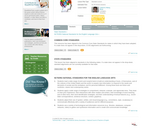
Students will read a text and then they will demonstrate their new vocabulary knowledge through appropriate use of the words in context and with accompanying illustrations. They will create of an ABC book through individual and small-group activities. Students will take an active role in their learning by identifying the content area vocabulary they want to research. This lesson can be implemented in any content classroom.

This teacher's guide for Addie on the Inside by James Howe contains discussion questions, activities, and research assignments.

The Adventurers of Sojourner presents a third-person narrative account of the Mars Pathfinder mission, which included the deployment of a small science rover named Sojourner. In this CCSS lesson, students will explore this history through text dependent questions, academic vocabulary, and writing assignments.

Students will learn about Princeville, NC, the oldest town in the United States incorporated entirely by African Americans. Students will learn about the challenges that faced newly freed slaves.

In Ray Bradbury's “All Summer in A Day†takes place on the planet Venus in a future world where people have come to set up a civilization. In this CCSS lesson students will explore this fiction story through text dependent questions, academic vocabulary, and writing assignments.
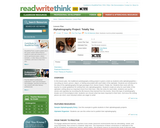
In this lesson plan, the traditional autobiography writing project is given a twist as students write alphabiographies—recording an event, person, object, or feeling associated with each letter of the alphabet. Students are introduced to the idea of the alphabiography through passages from James Howe's Totally Joe. Students then work with the teacher to create guidelines for writing their own alphabiographies. Students create an entry for each letter of the alphabet, writing about an important event from their lives. After the entry for each letter, students sum up the stories and vignettes by recording the life lessons they learned from the events. Since this type of autobiography breaks out of chronological order, students can choose what has been important in their lives. And since the writing pieces are short, even reluctant writers are eager to write!

In 1937, pilot Amelia Earhart planned to be the first to succeed in a dangerous flight. However, her journey was plagued with many obstacles, and controversy continues to surround the theories that attempt to explain her mysterious disappearance. In this CCSS lesson students will explore her life through text dependent questions, academic vocabulary, and writing assignments. Included are sample writing tasks.

In this lesson, students recognize the cultural contributions of ancient Greek and Roman mythology and drama. They will read and analyze a myth and then create a puppet skit to demonstrate the myth.

In this lesson, students will compare/contrast the information in their textbook about Andrew Jackson to political cartoons of the era. Students will identify symbols, allusions and stereotypes used in these cartoons and infer the intended message and tone of the Jackson era cartoons. Students will also identify any biases in the cartoons and check for historical accuracy, and then formulate their own opinion about the Jackson Administration. As a culminating activity, students will write an opinion essay that articulates their personal stance on Andrew Jackson’s character, using proper writing conventions.
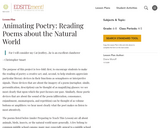
The purpose of this project is two-fold: first, to encourage students to make the reading of poetry a creative act; and, second, to help students appreciate particular literary devices in their functions as semaphores or interpretive signals. Those devices that are about the imagery of a poem (metaphor, simile, personification, description) can be thought of as magnifying glasses: we see most clearly that upon which the poet focuses our gaze. Similarly, those poetic devices that are about the sound of the poem (alliteration, consonance, enjambment, onomatopoeia, and repetition) can be thought of as volume buttons or amplifiers: we hear most clearly what the poet makes us listen to most attentively.

In this 14 day unit plan students read, research, draw conclusions, and write beginning level argumentative essays comparing/contrasting major world religions.
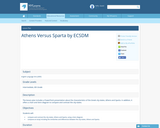
Students will: compare and contrast the city-states, Athens and Sparta, using a Venn diagram. compose an essay including the similarities and differences between the city-states, Athens and Sparta.
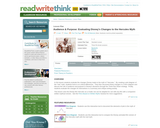
What drives changes to classic myths and fables? In this lesson students evaluate the changes Disney made to the myth of "Hercules" in order to achieve their audience and purpose.

This lesson explores the language of electronic messages and how it affects other writing. Furthermore, it explores the freedom and creativity for using Internet abbreviations for specific purposes and examines the importance of a more formal style of writing based on audience.

The short story, titled “Becky and the Wheel-and-Brake Boys,†is about how Becky desperately wants to own a bike despite the resistance she is met with from her mother and Granny-Liz. In this CCSS lesson students will explore this short story through text dependent questions, academic vocabulary, and writing assignments.

This story, set in 1820s Austria, is a series of letters written between a young boy, Christoph, who lives in Vienna and his uncle, a music student who lives in Salzburg. In the letters, Christoph tells his uncle of the strange gentleman, Ludwig van Beethoven, who has rented a room in the boy’s home. In this CCSS lesson students will explore this story through text dependent questions, academic vocabulary, and writing assignments.

In this lesson, students will consider the strategies Ida B. Wells deployed to raise awareness of social problems and weigh the effectiveness of nonconformity to address a specific audience. Students will use Wells' story to write about a personal experience of conformity or non-conformity.